Duiker W.J., Spielvogel J.J. The Essential World History. Volume 2: Since 1500
Подождите немного. Документ загружается.

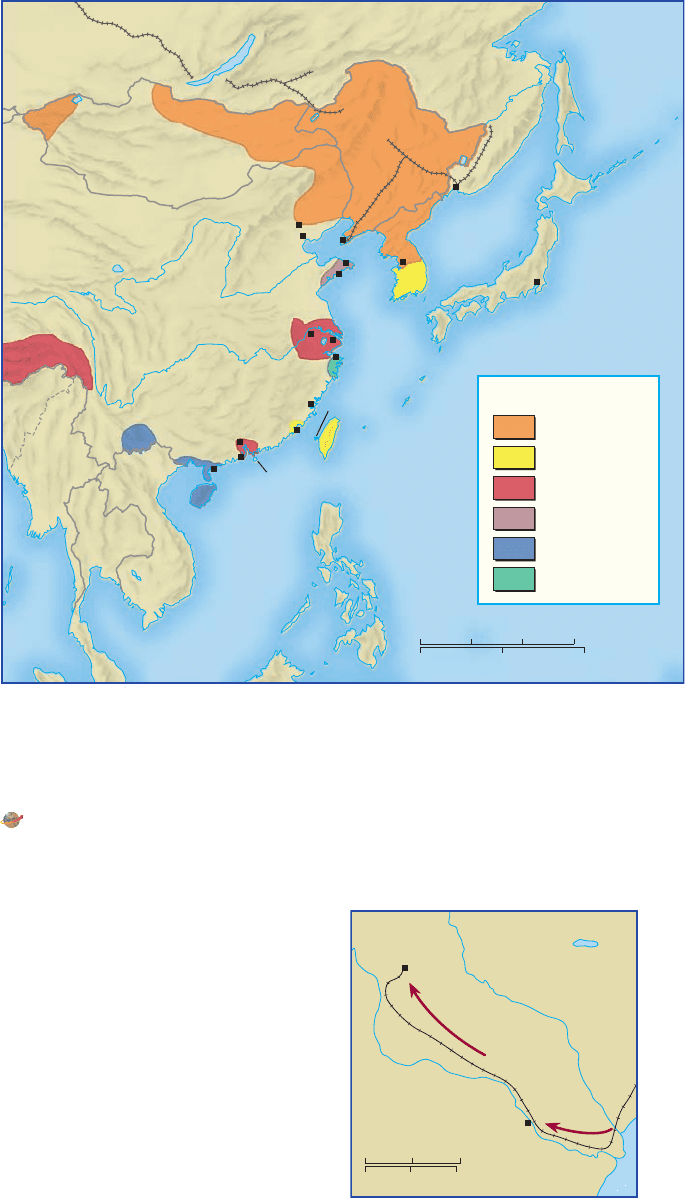
Opening the Door to China During
the next two years, foreign pressure on
the dynasty intensified. With encour-
agement from the British, who hoped
to avert a total collapse of the Manchu
Empire, U.S. Secretary of State John
Hay presented the other imperialist
powers with a proposal to ensure
equal economic a ccess to the China
market for all states. Hay also sug-
gested that all powers join together to
guarantee the territorial and admin-
istra tive integrity of the Chinese
Empire. Though probably motivated
more by the United States’ preference
for open markets than by a be-
nevolent wish to protect China,
the so-called Open Door Notes
did have the practical effect of
reducing the imperialist hysteria
over access to the China market.
The ‘‘gentlemen’s agreement’’
about the Open Door (it was not
a treaty, but merely a pious and
nonbinding expression of intent)
served to deflate fears in Britain,
France, Ge rmany, and Russia that
other powers would take advan-
tage of China’s weakness to
dominate the China market.
In the long run, then, the
Open Door was a positive step that
brought a measure of sanity to
imperialist meddling in East Asia.
U nfortunately, it came too late
to stop the domestic explosion
known as the Bo x er Rebellion. The
Boxers, so-called because of the
physical exercises they performed
(which closely resembled the more
martial forms of tai chi), were
members of a secret society oper-
ating primarily in rural areas in
northern China. Provoked by a
damaging drought and high un-
employment caused in part by
foreign economic activity (the in-
troduction of railr oads and
steamships, for example, undercut
the livelihood of barge workers on
the rivers and canals), the Boxers
attacked foreign residents and be-
sieged the foreign legation quarter
in Beijing until the foreigners were res-
cued by an international expeditionary
force in the late summer of 1900. As
punishment, the foreign troops de-
stroy ed a number of temples in the
capital suburbs, and the Chinese gov-
ernment was compelled to pay a heavy
indemnity to the foreign governments
inv olv ed in suppressing the uprising.
The Collapse of the Old Order
During the next few years, the old dy-
nasty tried desperately to reform itself.
The empress dowager, who had long
Tokyo
Vladivostok
Seoul
Beijing
Tianjin
Port Arthur (Russ.)
Weihaiwei (Br.)
Qingdao
(Ger.)
Nanjing
Shanghai
Ningpo
Fuzhou
Amoy
Canton
Macao (Port.)
Guangzhouwan
(Fr.)
YUNNAN
M
A
R
I
T
I
M
E
P
R
O
V
.
THAILAND
BURMA
INDIA
TIBET
CHINA
MONGOLIA
RUSSIA
MANCHURIA
SIBERIA
KOREA
JAPAN
TAIWAN
(FORMOSA)
PHILIPPINE
ISLANDS
FR.
INDO-
CHINA
South
China Sea
Pacific
Ocean
Sea of Japan
(East Sea)
Y
a
n
g
t
z
e
R
.
Y
e
l
l
o
w
R
.
A
m
u
r
R
.
Sakhalin
R
y
u
k
y
u
I
s
.
Hong
Kong
(Br.)
Pescadores Is.
S
H
A
N
D
O
N
G
0 500 1,000 Miles
0 500 1,000 1,500 Kilometers
Russian
Japanese
British
German
French
Italian
Spheres of Influence
MAP 22.3 Foreign Possessions and Spheres of Influence About 1900. At the end
of the nineteenth century, China was being carved up like a melon by foreign imperialist
powers.
Q
Which of the areas mark ed on the map were removed from Chinese control during
the nineteenth century?
View an animated version of this map or related maps at www .c engage.c om/history/
duikspiel/essentialworld6e
Y
o
n
g
d
i
n
g
C
h
a
o
b
a
i
X
i
n
h
e
Beijing
Tianjin
Bo
Hai
30 Miles
50 Kilometers0
0
The I nternational Expediti onary
Force Advances to Beijing to
Suppress the Boxers
546 CHAPTER 22 SHADOWS OVER THE PACIFIC: EAST ASIA UNDER CHALLENGE
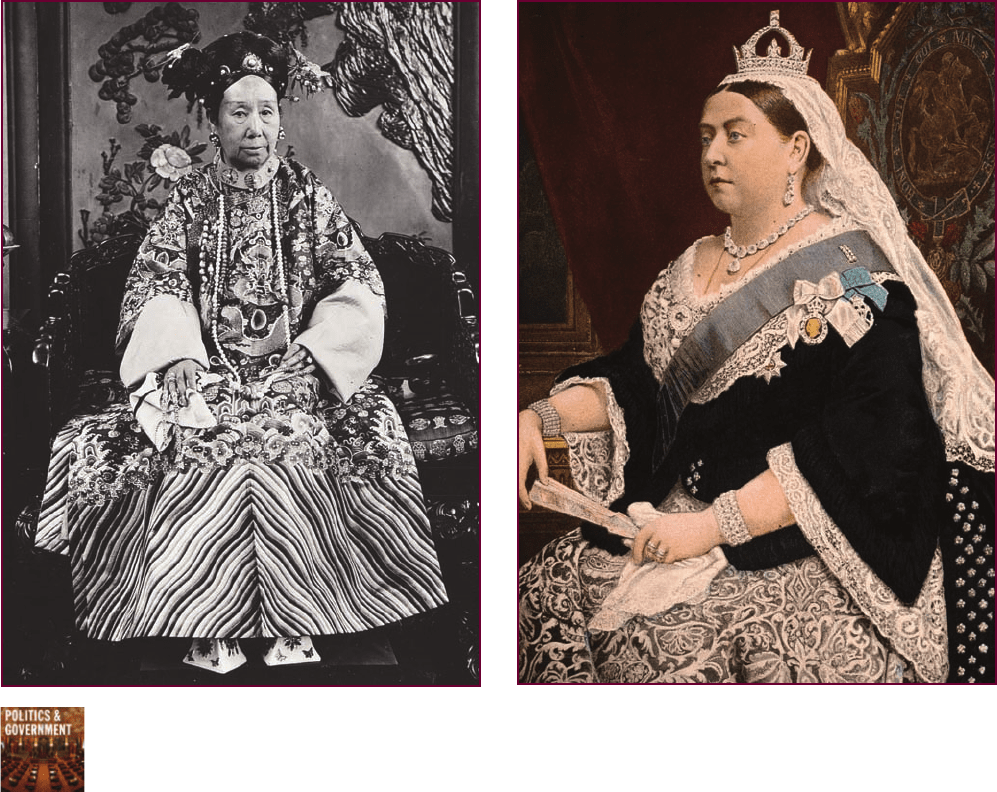
resisted change, now embraced a number of reforms. The
venerable civil service examination system was replaced
by a new educational system based on the Western model.
In 1905, a commission was formed to study constitu-
tional changes; over the next few years, legislative as-
semblies were established at the provincial level, and
elections for a national assembly were held in 1910.
Such moves helped shore up the dynasty temporarily,
but history shows that the most dangerous period for an
authoritarian system is when it begins to reform itself,
because change breeds instability and performance rarely
matches rising expectations. Such was the case in China.
The emerging new provincial elite, composed of mer-
chants, professionals, and reform-minded gentry, soon
COMPARATIVE ILLUSTRATION
Female Rulers—Ea st and West. The prominent female rulers in the late
nineteenth century were Empress Dowager Cixi of China and Queen Victoria of
Great Britain. Cixi, shown at the left, was the most powerful figure in late-
nineteenth-century China. Originally a concubine at the imperial court, she later placed her
young nephew on the throne and dominated the political scene for a quarter of a century
until her death in 1908. Conservative in her views, she staunchly resisted her advisers’
suggestions for changes to help China face the challenge posed by the West. Queen Victoria,
shown at the right, had the longest reign in British history (1837–1901). During this time, the
British Empire reached the height of its power, but by the turn of the twentieth century, the
monarchy was increasingly less relevant in Britain’s liberal parliamentary system of
government. Nevertheless, Victoria’s sense of duty and moral responsibility reflected the
attitudes of her age, which has ever since been known as the Victorian Age.
Q
What other examples of influential female rulers can you recall from previous
ch apters in this book? What is distinctive about the two shown here?
c
The Art Archive/Gianni Dagli Orti
c
The Art Archive/Gianni Dagli Orti
THE DECLINE OF THE MANCHUS 547
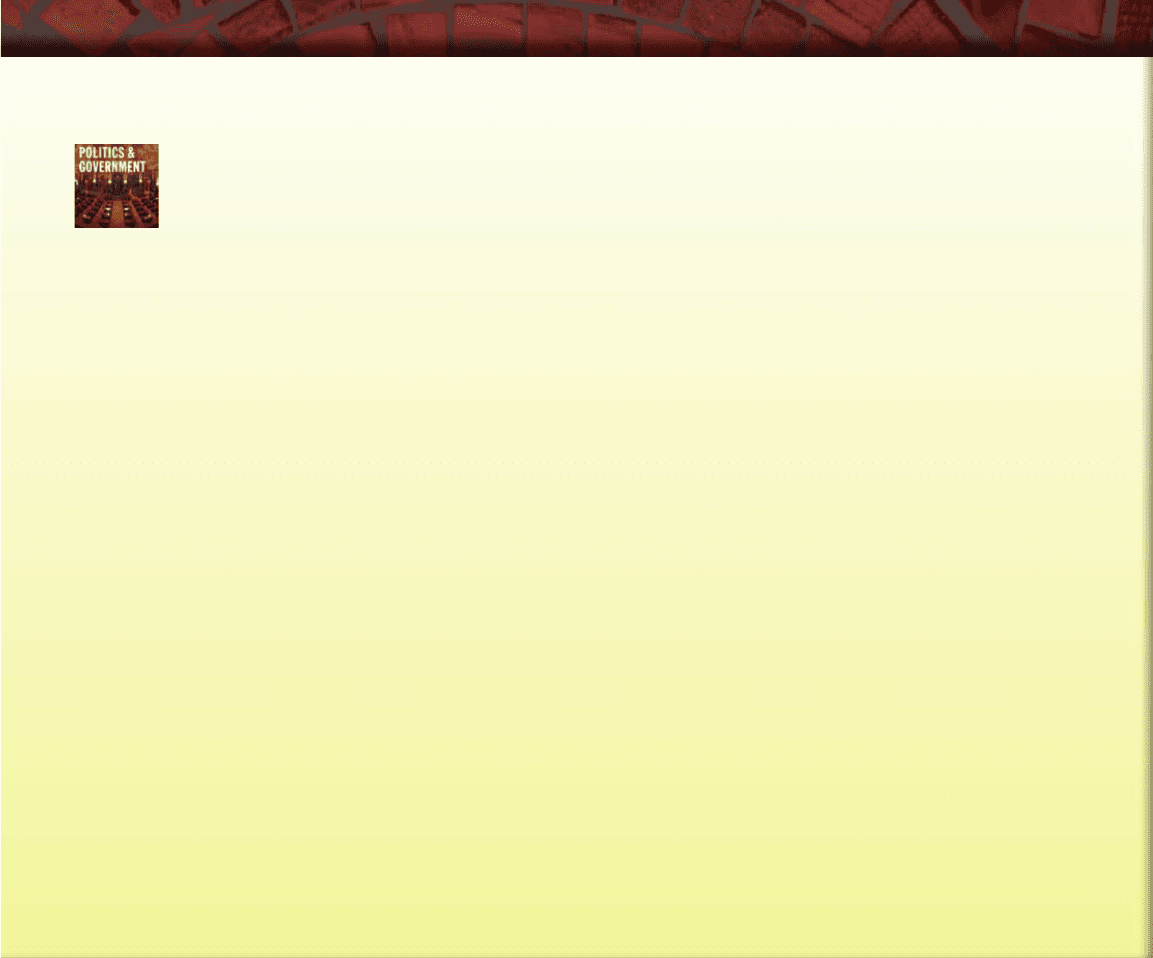
became impatient with the slow pace of political change
and were disillusioned to find that the new assemblies
were intended to be primarily advisory rather than legis-
lative. The government also alienated influential elements
by financing railway development projects through foreign
firms rather than local investors. The reforms also had
little meaning for peasants, artisans, miners, and trans-
portation workers, whose living conditions were being
eroded by rising taxes and official venality. Rising rural
unrest was an ominous sign of deep-seated resentment to
which the dynasty would not, or could not, respond.
The Rise of Sun Yat-sen The first physical manifes-
tations of future revolution appeared during the last de-
cade of the nineteenth century with the formation of the
Revive China Society by the young radical Sun Yat-sen
(1866--1925). Born in a village south of Canton, Sun was
educated in Hawaii and returned to China to practice
medicine. Soon he turned his full attention to the ills of
Chinese society.
At first, Sun’s efforts yielded few positive results, but in
a conv ention in Tokyo in 1905, he managed to unite radical
groups from across China in the so-called R evolutionary
Alliance (Tongmenghui, or T’ung M eng H ui). The new
organization’ s program was based on Sun’ s ‘‘thr ee people’s
principles’’ of nationalism (meaning primarily the elimi-
nation of Ma nchu rule over China), democracy, and peo-
ple’s livelihood. It called for a three-stage process beginning
with a military takeo v er and ending with a constitutional
democracy (see the box abov e). Although the new
PROGRAM FOR A NEW CHINA
In 1905, Sun Yat-sen united a number of
anti-Manchu groups into a single patriotic organiza-
tion called the Revolutionary Alliance (Tongmeng-
hui). The new organization eventually formed the
core of his Guomindang, or Nationalist Party. This excerpt is
from the organization’s manifesto, published in 1905 in Tokyo.
Note that Sun believed that the Chinese people were not ready
for democracy and required a period of tutelage to prepare
them for the final era of constitutional government. This was a
formula that would be adopted by many other political leaders
in Asia and Africa after World War II.
Sun Yat-sen, Manifesto for the Tongmenghui
By order of the Military Government, ...the Commander-in-Chief
of the Chinese National Army proclaims the purposes and platform
of the Military Government to the people of the nation:
Therefore we proclaim to the world in utmost sincerity the
outline of the present revolution and the fundamental plan for the
future administration of the nation.
1. Drive out the Tartars: The Manchus of today were originally the
eastern barbarians beyond the Great Wall. They frequently caused
border troubles during the Ming dynasty; then when China was
in a disturbed state they came inside Shanhaikuan, conquered
China, and enslaved our Chinese people. ... The extreme cruel-
ties and tyrannies of the Manchu government have now reached
their limit. With the righteous army poised against them, we will
overthrow that government, and restore our sovereign rights.
2. Restore China: China is the China of the Chinese. The govern-
ment of China should be in the hands of the Chinese. After
driving out the Tartars we must restore our national state. ...
3. Establish the Republic: Now our revolution is based on equality,
in order to establish a republican government. All our people
are equal and all enjoy political rights. ...
4. Equalize land ownership: The good fortune of civilization is to
be shared equally by all the people of the nation. We should im-
prove our social and economic organization, and assess the value
of all the land in the country. Its present price shall be received
by the owner, but all increases in value resulting from reform
and social improvements after the revolution shall belong to the
state, to be shared by all the people, in order to create a socialist
state, where each family within the empire can be well supported,
each person satisfied, and no one fail to secure employment. ...
The above four points will be carried out in three steps in due
order. The first period is government by military law. When the
righteous army has arisen, various places will join the cause. ...
Evils like the oppression of the government, the greed and graft of
officials, ...the cruelty of tortures and penalties, the tyranny of tax
collections, the humiliation of the queue [the requirement that all
Chinese males braid their hair]---shall all be exterminated together
with the Manchu rule. Evils in social customs, such as the keeping
of slaves, the cruelty of foot binding, the spread of the poison of
opium, should also all be prohibited. ...
The second period is that of government by a provisional
constitution. When military law is lifted in each hsien [district], the
Military Government shall return the right of self-government to the
local people. ...
The third period will be government under the constitution. Six
years after the provisional constitution has been enforced a constitu-
tion shall be made. The military and administrative powers of the Mili-
tary Government shall be annulled; the people shall elect the president,
and elect the members of parliament to organize the parliament.
Q
What were Sun Yat-sen’s key proposals to transform
China into a modern, technologically based society? How does
his program compare with the so-called Meiji reforms in Japan,
discussed later in this chapter?
548 CHAPTER 22 SHADOWS OVER THE PACIFIC: EAST ASIA UNDER CHALLENGE

organization was small and r elativ ely inexperienced, it
benefited from rising popular discontent.
The Revolution of 1911 In October 1911, Sun’s fol-
lowers launched an uprising in the industrial center of
Wuhan, in central China. With Sun traveling in the
United States, the insurrection lacked leadership, but the
decrepit government’s inability to react quickly encour-
aged political forces at the provincial level to take mea-
sures into their own hands. The dynasty was now in a
state of virtual collapse: the empress dowager had died in
1908, one day after her nephew; the throne was now oc-
cupied by China’s ‘‘last emperor,’’ the infant Puyi (P’u Yi).
Sun’s party had neither the military strength nor the
political base necessary to seize the initiative, however,
and was forced to turn to a representative of the old order,
General Yuan Shikai (Yuan Shih-k’ai). A prominent figure
in military circles since the beginning of the century, Yuan
had been placed in charge of the imperial forces sent to
suppress the rebellion, but now he abandoned the Man-
chus and acted on his own behalf. In negotiations with
representatives of Sun Yat-sen’s party (Sun himself had
arrived in China in January 1912), he agreed to serve as
president of a new Chinese republic. The old dynasty and
the age-old system that it had attempted to preserve were
no more.
Although the dynasty w as gone, Sun and his fol-
lowers were unable to consolidate the ir gains. The pro-
gram of the Revolutionary Alliance was based on
Western liberal democrat ic principles aimed at the ur-
ban middle class, but the middle class in China was too
small to form the basis for a new political order. The vast
major ity of the Chinese people still lived on the land.
Sun had hoped to win their support with a land reform
program, but few peasants had participated in the 1911
revolution. In failing to create new institutions and
values t o provide a framework for a chan ging society,
the events of 1911 were less a revolution than a collapse
of the old order. Weakened by impe rialism an d its own
internal weaknesses, the old dynasty had come to an
abrupt e nd before new political and social forces were
ready to fill the vacuum.
FILM & HISTORY
T
HE LAST EMPEROR (1987)
On November 14, 1908, the Chinese emperor
Guangxu died in Beijing. One day later,
Empress Dowager Cixi---the real power behind
the throne---passed away as well. A three-year-
old boy, to be known in histor y as Henr y
Puyi, ascended the throne. Three years later,
the Qing dynast y collapsed, and the deposed
monarch lived out the remainder of his life
in a China lashed by political turmoil and
violence. He finally died in 1967 at the
height of the Great Proletarian Cultural
Revolution.
The Last Emperor (1987), directed by the
Italian filmmaker Bernardo Bertolucci, is a bril-
liant portrayal of the experience of one hapless
individual in a nation caught up in the throes of
a seemingly endless revolution. The film evokes
the fading majesty of the last days of imperial
China but also the chaos of the warlord era and
the terrors of the Maoist period, when the last
shreds of the former emperor’s personality were
shattered under the pressure of Communist brainwashing
techniques. The main character, who never appears to
grasp what is happening to his country, lives and dies a
nonentity.
The film, based on Puyi’s autobiography, benefits from having
been filmed partly onsite in the Imperial City. The only major West-
ern actor to appear in the movie is the veteran film star Peter
O’Toole, who plays Puyi’s tutor when he was an adolescent.
Three-year-old Puyi (Richard Vuu), the last emperor of China, watches an emissary approach at
the Imperial Palace.
Yanco/Tao/Recorded Picture Co/ The Kobal Collection
THE DECLINE OF THE MANCHUS 549

What China had experienced was part of a historical
process that was bringing down traditional empires across
the globe, both in regions threatened by Western impe-
rialism and in Europe itself, where tsarist Russia, the
Austro-Hungarian Empire, and the Ottoman Empire all
came to an end within a few years after the collapse of the
Qing. The circumstances of their demise were not all the
same. The Austro-Hungarian Empire, for example, was
dismembered by the victorious allies after World War I,
and the fate of tsarist Russia was directly linked to that
conflict. Still, all four regimes shared the responsibility for
their common fate in that they had failed to meet the
challenges posed by the times. All had responded to the
forces of industrialization and popular participation in
the political process with hesitation and reluctance, and
their attempts at reform were too little and too late. All
paid the supreme price for their folly.
Chinese Society in Transition
Q
Focus Question: What political, economic, and social
reforms were instituted by the Qing dynast y during its
final decades, and why were they not more successful
in reversing the decline of Manchu rule?
The growing Western presence in China during the late
nineteenth and early twentieth centuries obviously had a
major impact on Chinese society; hence many historians
have traditionally asserted that the arrival of the Euro-
peans shook China out of centuries of slumber and
launched it on the road to revolutionary change. In fact,
when the European economic penetration began to ac-
celerate in the mid-nineteenth century, Chinese society
was already in a state of transition. The growth of in-
dustry and trade was particularly noticeable in the cities,
where a national market for such commodities as oil,
copper, salt, tea, and porcelain had developed. The
foundation of an infrastructure more conducive to the
rise of a money economy appeared to be in place. In
the countryside, new crops introduced from abroad sig-
nificantly increased food production and aided popula-
tion growth. The Chinese economy had never been more
productive or more complex.
Obstacles to Industrialization
Whether these changes by themselves would eventually
have led to an industrial revolution and the rise of a
capitalist society on the Western model in the absence of
Western intervention is a question that historians cannot
answer. Certainly, a number of obstacles would have
made it difficult for China to embark on the Western path
if it had wished to do so.
Although industrial production was on the rise, it
was still based almost entirely on traditional methods.
There was no uniform system of weights and measures,
and the banking system was still primitive by European
standards. The use of paper money, invented by the
Chinese centuries earlier, was still relatively limited. The
transportation system, which had been neglected since
the end of the Yuan dynasty, was increasingly chaotic.
There were few paved roads, and the Grand Canal,
long the most efficient means of carrying goods from
north to south, was silting up. As a result, merchants had
to rely more and more on the coastal route, where they
faced increasing competition from foreign shipping.
Although foreign concession areas in the coastal cities
provided a conduit for the importation of Western
technology and modern manufacturing methods, the
Chinese borrowed less than they might have. Foreign
manufacturing enterprises could not legally operate in
China until the last decade of the nineteenth century, and
their methods had little influence beyond the concession
areas. Chinese efforts to imitate Western methods, nota-
bly in shipbuilding and weapons manufacture, were
dominated by the government and often suffered from
mismanagement.
Equally serious problems persisted in the country-
side. The rapid increase in population had led to smaller
plots and burgeoning numbers of tenant farmers.
Whether per capita consumption of food was on the
decline is not clear from the available evidence, but ap-
parently rice as a staple of the diet was increasingly being
replaced by less nutritious foods. Some farmers benefited
from switching to commercial agriculture to supply the
markets of the growing coastal cities, but the shift entailed
CHRONOL OGY
ChinaintheEraofImperialism
Lord Macartney’s mission to China 1793
Opium War 1839--1842
Taiping rebels seize Nanjing 1853
Taiping Rebellion suppressed 1864
Cixi becomes regent for nephew,
the Guangxu emperor
1878
Sino-Japanese War 1894--1895
One Hundred Days reform 1898
Open Door policy 1899
Boxer Rebellion 1900
Commission to study constitution formed 1905
Deaths of Cixi and the Guangxu emperor 1908
Revolution in China 1911
550 CHAPTER 22 SHADOWS OVER THE PACIFIC: EAST ASIA UNDER CHALLENGE
a sizable investment. Many farmers went so deeply into
debt that they eventually lost their land.
Most important, perhaps, was that the Qing dynasty
was still locked into a traditional mind-set that discour-
aged commercial activities and prized the time-honored
virtues of agrarian society. China also lacked the Euro-
pean tradition of a vigorous and self-confident merchant
class based in cities that were autonomous.
The Impact of Imperialism In any event, the advent of
the imperialist era in the second half of the nineteenth
century made such questions academic; imperialism
created serious distortions in the local economy that re-
sulted in massive changes in Chinese society during the
twentieth century. Whether the Western intrusion was
beneficial or harmful is debated to this day. The Western
presence undoubtedly accelerated the development of the
Chinese economy in some ways: the introduction of
modern means of production, transport, and communi-
cations; the creation of an export market; and the steady
integration of the Chinese market into the nineteenth-
century global economy. To many Westerners at the time,
it was self-evident that such changes would ultimately
benefit the Chinese people (see the comparative essay
‘‘Imperialism and the Global Environment’’ on p. 552). In
their view, Western civilization represented the most ad-
vanced stage of human development. By supplying (in the
catch phrase of the day) ‘‘oil for the lamps of China,’’ it
was providing a backward society with an opportunity
to move up a notch or two on the ladder of human
evolution.
Not everyone agreed. The Russian Marxist Vladimir
Lenin contended that Western imperialism actually
hindered the process of structural change in preindus-
trial societies because it thwarted the rise of a local in-
dustrial and commercial sector in order to maintain
colonies and semicolonies as a market for Western
manufactured goods and a source of cheap labor and
mate rials. Fell ow Marxists in China such as Mao Zedong
(see Chapter 24) later took up Lenin’s charge and as-
serted that if the West had not intervened, Chi na would
have found its own road to capitalism and th ence to
socialism and communism.
Many historians today would say that the answer is
too complex for such simplistic explanations. By shaking
China out of its traditional mind-set, imperialism accel-
erated the process of change that had begun in the late
Ming and early Qing periods and forced the Chinese to
adopt new ways of thinking and acting. At the same time,
China paid a heavy price in the destruction of its local
industry while many of the profits flowed abroad. Al-
though industrial revolution is a painful process when-
ever and wherever it occurs, the Chinese found the
experience doubly painful because it was foisted on China
from the outside.
Daily Life
At the beginning of the ninetee nth century, daily life for
most Chinese was not substantially different from what
it had been centuries earlier. Most were farmers, living
in millions of villages in rice fields and on hi llsides
thro ughout the countryside. Their lives were governed
by the harvest cycle, village custom, and family ritual.
Their roles in society were firmly fixed by the time-
honored principles of Confucian social ethics. Male
children, at least the more fortunate ones, were edu-
cated in the Confucian classics, while females remained
in the home or in the fields. All children were expecte d
to obey their parents, and all wives to submit to their
husbands.
A visitor to China a hundred years later would have
seen a very different society, although one still recogniz-
ably Chinese. Change was most striking in the coastal
cities, where the educated and affluent had been visibly
affected by the growing Western cultural presence. Con-
fucian social institutions and behavioral norms were de-
clining rapidly in influence, while those of Europe and
North America were on the ascendant. Change was much
less noticeable in the countryside, but even there, the
customary bonds had been dangerously frayed by the
rapidly changing times.
Some of the change can be traced to the educational
system. During the nineteenth century, the importance of
a Confucian education steadily declined as up to half of
the degree holders had purchased their degrees. After
1906, when the government abolished the civil service
examinations, a Confucian education ceased to be the key
to a successful career, and Western-style education be-
came more desirable. The old dynasty attempted to
modernize by establishing an educational system on the
Western model with universal education at the elemen-
tary level. Such plans had some effect in the cities, where
public schools, missionary schools, and other private
institutions educated a new generation of Chinese with
little knowledge of or respect for the past.
The Status of Women The status of women was also in
transition. During the mid-Qing era, women were still
expected to remain in the home. Their status as useless
sex objects was painfully symbolized by the practice of
foot binding, a custom that had probably originated
among court entertainers in the Tang dynasty and spread
to the common people by the Song. By the mid-
nineteenth century, more than half of all adult women
probably had bound feet.
CHINE SE SOCIETY IN TRANSITION 551
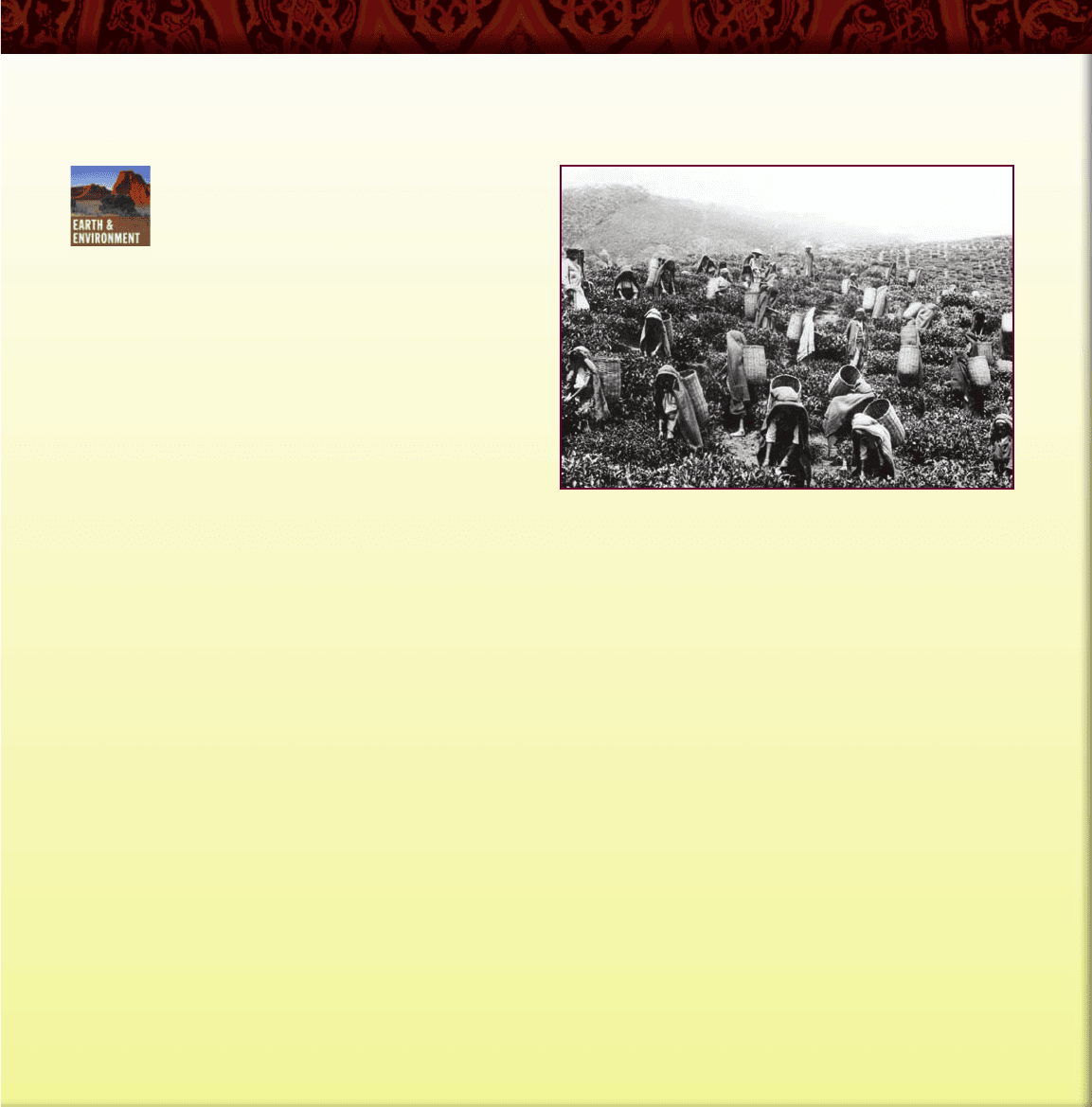
During the second half of the nineteenth century,
signs of change began to appear. Women began to seek
employment in factories---notably in cotton mills and
in the silk industr y, established in Shang hai in the
1890s. Some women were active in dissident activities,
such as the Taiping Rebellion and the Boxer movement,
and a few fought beside men in the 1911 revolution.
QiuJin,awell-knownfemalerevolutionary,wrotea
manifesto calling for women’s liberation and then or-
ganized a revo lt against the Manchu government, only
to be captured and executed at the age of thir ty-two
in 1907.
COMPARATIVE ESSAY
I
MPERIALISM AND THE GLOBAL ENVIRONMENT
As we have seen, beginning in the 1870s,
European states engaged in an intense scramble
for overseas territory. This ‘‘new imperialism’’ led
Europeans to carve up Asia and Africa and create
colonial empires. Within these empires, European states exer-
cised com pl ete political control over the indigenous soci eties
and re drew politica l boundaries to meet their nee ds. In Africa,
for exa mple, in drawing the boundaries that separated one col-
ony from anothe r (boundarie s that often became the bound-
aries of the modern countries of Africa), Europeans paid no
attention to the existing political divisions; they ofte n divided
cohesive communities between colonies or incorporated two
communities that were hostile to ea ch other into the same
colony.
In similar fashion, Europeans paid little or no heed to the
economic needs of their colonial subjects but instead arranged the
economies of their empires to meet their own needs in the world
market. In the process, Europeans often dramatically altered the
glo bal environment, a transformation that was made visible in a
vari ety of ways. Westerners built railw ays and ports, erected tele-
graph lines, d rilled for oil, and mined for gold, tin, iron ore, and
copper. All of these projects transformed and often scarred the
natu ral landscape.
Landscapes, however, were even more dramatically altered by
Europe’s demand for cash food crops. Throughout vast regions of
Africa and Asia, tropical forests were felled to make way for planta-
tions that cultivated crops that could be exported for sale. In Ceylon
(modern Sri Lanka) and India, the British cut down vast tropical
forests to plant row upon row of tea bushes. The Dutch razed for-
ests in the East Indies to plant cinchona trees imported from Peru.
(Quinine, derived from the trees’ bark, dramatically reduced the
death rate from malaria and made it possible for Europeans to live
more securely in the tropical regions of Africa and Asia.) In Indo-
china, the French replaced extensive forests with sugar and coffee
plantations. Native workers, who were usually paid pitiful wages by
their European overseers, provided the labor for all of these vast
plantations.
In many areas, precious farmland was turned over to the culti-
vation of cash crops. In the Dutch East Indies, farmers were forced
to plow up some of their rice fields to make way for the cultivation
of sugar. In West Africa, overplanting of cash crops damaged fragile
grasslands and turned parts of the Sahel into a wasteland.
European states, however, greatly profited from this trans-
formed environment. In Agriculture in the Tropics: An Elementary
Treatise, written in 1909, the British botanist John Christopher Willis
expressed his thoughts on this European policy:
Whether planting in the tropics will always continue to be
under European management is another question, but the
northern powers will not pe rmit that the rich and as yet com-
paratively undeveloped countries of the tropics should be en-
tirely wasted by being devoted me rely to the supply of the food
and clothing wants of their own people, when the y can also
supply the wants of the colder zones in so many indispensable
products.
In Willis’s eyes, the imperialist transformation of the environ-
ments of Asia and Africa to serve European needs was entirely
justified.
Q
How would you compare the effects of imperialism on
the environment in colonial countries with the impact of the
Industrial Revolution in Europe and North America?
Picking Tea Leaves in Ceylon. In this 1900 photograph, women
on a plantation in Ceylon (Sri Lanka) pick tea leaves for shipment abroad.
The British cut down vast stands of tropical forests in Ceylon and India to
grow tea to satisfy demand back home.
c
Getty Images
552 CHAPTER 22 SHADOWS OVER THE PACIFIC: EAST ASIA UNDER CHALLENGE
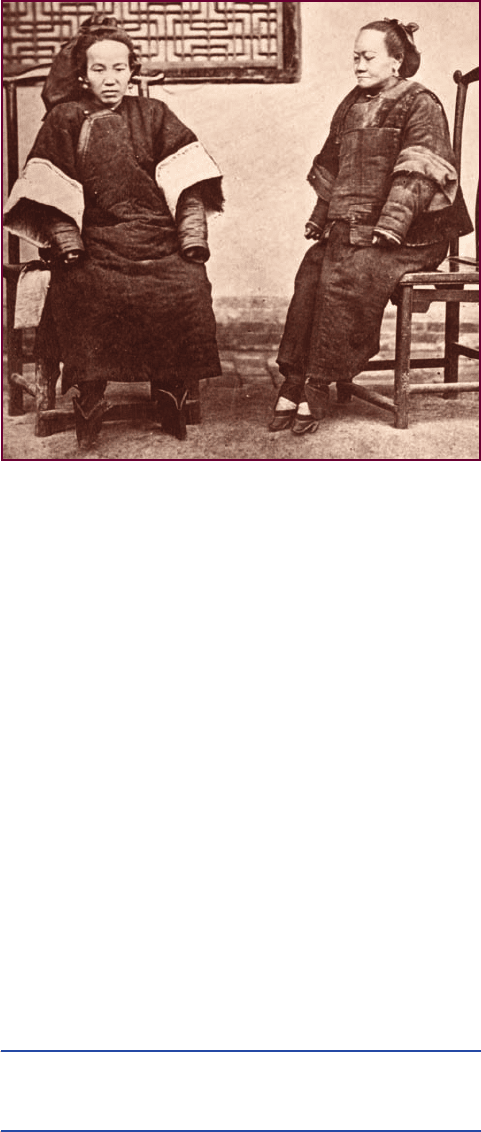
By the end of the century, educational opportunities
for women began to appear for the first time. Christian
missionaries opened some girls’ schools, mainly in the
foreign concession areas. Although only a relatively small
number of women were educated in these schools, they
had a significant impact on Chinese society as progressive
intellectuals began to argue that ignorant women pro-
duced ignorant children. In 1905, the court announced its
intention to open public schools for girls, but few such
schools ever materialized. The government also began to
take steps to discourage the practice of foot binding,
initially with only minimal success.
A Rich Country and a Strong
State: The Rise of Modern Japan
Q
Focus Question: To what degree was the Meiji
Restoration a ‘‘revolution,’’ and to what degree did it
succeed in transforming Japan?
By the beginning of the nineteenth century, the Tokugawa
shogunate had ruled the Japanese islands for two hundred
years. It had revitalized the old governmental system,
which had virtually disintegrated under its predecessors.
It had driven out the foreign traders and missionaries and
isolated the country from almost all contacts with the
outside world. The Tokugawa maintained formal rela-
tions only with Korea, although informal trading links
with Dutch and Chinese merchants continued at
Nagasaki. Isolation, however, did not mean stagnation.
Although the vast majority of Japanese still depended on
agriculture for their livelihood, a vigorous manufacturing
and commercial sector had begun to emerge during the
long period of peace and prosperity. As a result, Japanese
society had begun to undergo deep-seated changes, and
traditional class distinctions were becoming blurred.
Eventually, these changes would end Tokugawa rule and
destroy the traditional feudal system.
Some historians speculate that the Tokugawa system
was beginning to come apart, just as the medieval order
in Europe had started to disintegrate at the beginning of
the Renaissance. Factionalism and corruption plagued the
central bureaucracy, while rural unrest, provoked by a
series of poor harvests brought about by bad weather,
swept the countryside. Farmers fled to the towns, where
anger was already rising as a result of declining agricul-
tural incomes and shrinking stipends for the samurai.
Many of the samurai lashed out at the perceived in-
competence and corruption of the government. In re-
sponse, the bakufu became increasingly rigid, persecuting
its critics and attempting to force fleeing peasants to re-
turn to their lands. The government also intensified its
efforts to maintain the nation’s isolation from the outside
world, driving away foreign ships that were beginning to
prowl along the Japanese coast in increasing numbers.
An End to Isolation
To the Western powers, the continued isolation of Japa-
nese society was an affront and a challenge. Driven by the
growing rivalry among themselves and convinced that the
expansion of trade on a global basis would benefit all
nations, Western nations began to approach Japan in the
hope of opening up the hermit kingdom to foreign eco-
nomic interests.
The first to succeed was the United States. American
steamships crossing the northern Pacific needed a fueling
station before going on to China and other ports in the
area. In the summer of 1853, an American fleet of four
warships under Commodore Matthew C. Perry arrived in
Edo Bay (now Tokyo Bay) with a letter from President
Millard Fillmore asking for the opening of foreign rela-
tions between the two countries. A few months later, Perry
returned with a larger fleet for an answer. In his absence,
Japanese officials had hotly debated the issue. Some ar-
gued that contacts with the West would be both politically
and morally disadvantageous to Japan, while others
pointed to U.S. military superiority and recommended
Women with Bound Feet. To provide the best possible marriage for
their daughters, upper-class families began to perform foot binding during
the Song dynasty. Eventually, the practice spread to all social classes in
China. Although small feet were supposed to denote a woman of leisure,
most Chinese women with bound feet contributed to the labor force,
working mainly in textiles and handicrafts to supplement the family
income.
c
Royal Geographical Society/Alamy
ARICH COUNTRY AND A STRONG STATE:THE RIS E OF MODERN JAPAN 553
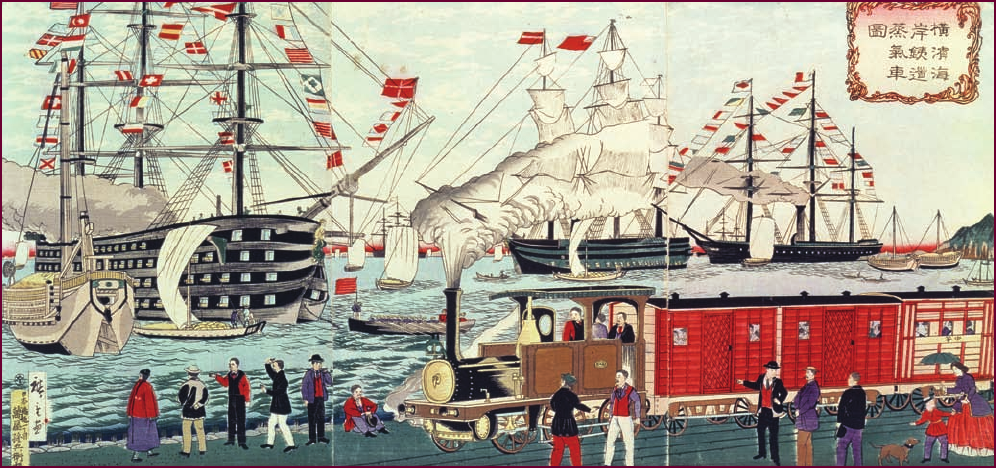
concessions. For the shogunate in Edo, the black guns of
Perry’s ships proved decisive, and Japan agreed to the
Treaty of Kanagawa, which provided for the return of
shipwrecked American sailors, the opening of two ports,
and the establishment of a U.S. consulate on Japanese soil.
In 1858, U.S. Consul Townsend Harris negotiated a more
elaborate commercial treaty calling for the opening of
several ports to U.S. trade and residence, the exchange of
ministers, and the granting of extraterritorial privileges for
U.S. residents in Japan. Similar treaties were soon signed
with several European nations.
The decision to open relations w ith the Western
barbarians was highly unpopular in some quarters, par-
ticularly in regions distant from the shogunate head-
quarters in Edo. Resistance was especially strong in two of
the key outside daimyo territories in the south, Satsuma
and Choshu, both of which had strong military tradi-
tions. In 1863, the ‘‘Sat-Cho’’ alliance forced the hapless
shogun to promise to end relations with the West. The
shogun eventually reneged on the agreement, but the
rebellious groups soon disclosed their own weakness.
When Choshu troops fired on Western ships in the Strait
of Shimonoseki, the Westerners fired back and destroyed
the Choshu fortifications. The incident convinced the
rebellious samurai of the need to strengthen their own
military and intensified their unwillingness to give in to
the West. Having strengthened their influence at the
imperial court in Kyoto, they demanded the shogun’s
resignation and the restoration of the emperor’s power. In
January 1868, rebel armies attacked the shogun’s palace in
Kyoto and proclaimed the restored authority of the em-
peror. After a few weeks, resistance collapsed, and the
venerable shogunate system was brought to an end.
The Meiji Restoration
Although the victory of the Sat-Cho faction had appeared
on the surface to be a triumph of tradition over change,
the new leaders soon realized that Japan must change to
survive. Accordingly, they embarked on a policy of
comprehensive reform that would lay the foundations of
a modern industrial nation within a generation.
The symbol of the new era was the young emperor
himself, who had taken the reign name Meiji (‘‘enlight-
ened rule’’) on ascending the throne after the death of his
father in 1867. Although the post-Tokugawa period was
termed a ‘‘restoration,’’ the Meiji ruler, who shared the
Sat-Cho group’s newly adopted modernist outlook, was
controlled by the new leadership just as the shogun had
controlled his predecessors. In tacit recognition of the real
source of political power, the new capital was located at
Edo (now renamed Tokyo, ‘‘eastern capital’’), and the
imperial court was moved to the shogun’s palace in the
center of the city.
A Gift for the Emperor. When Commodore Perry arrived in Tokyo Bay with a small fleet of U.S. warships
in July 1853, the size, speed, and armaments of the ‘‘black ships’’ frightened Japanese onlookers and
undoubtedly contributed to the willingness of the Tokugawa shogunate to seek a compromise with the
foreigners. One Japanese artist recorded his impression of the visitors, who on a later occasion offered their
hosts the gift of a steam locomotive.
c
Private Collection/The Bridgeman Art Library
554 CHAPTER 22 SHADOWS OVER THE PACIFIC: EAST ASIA UNDER CHALLENGE
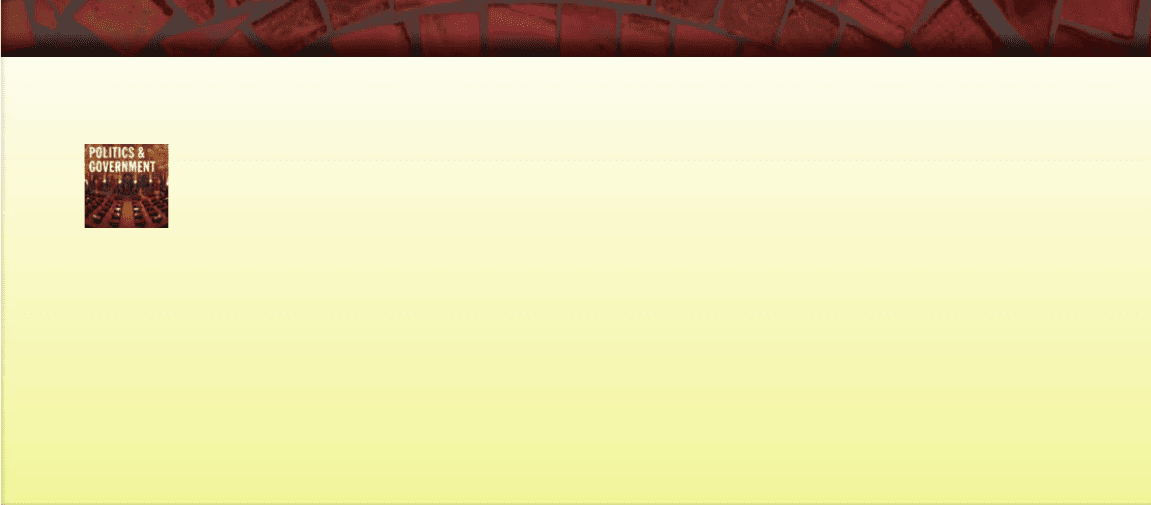
The Transformation of Japanese Politics Once in
power, the new leaders launched a comprehensive reform
of Japanese political, social, economic, and cultural in-
stitutions and values. They moved first to abolish the
remnants of the old order and strengthen executive power
in their hands. To undercut the power of the daimyo,
hereditary privileges were abolished in 1871, and the great
lords lost title to their lands. As compensation, they were
given government bonds and were named governors of
the territories formerly under their control. The samurai,
comprising about 8 percent of the total population, re-
ceived a lump-sum payment to replace their traditional
stipends, but they were forbidden to wear the sword, the
symbol of their hereditary status.
The Meiji modernizers also set out to create a
modern political system on the Western model. In the
Charter Oath of 1868, the new leaders promised to create
a new deliberative assembly within the framework of
continued imperial rule (see the box above). Although
senior positions in the new government were given to the
daimyo, the key posts were dominated by modernizing
samurai, eventually to be known as the genro, or elder
statesmen, from the Sat-Cho clique.
During the next two decades, the Meiji government
undertook a systematic study of Western political sys-
tems. A constitutional commission under Ito Hirobumi
traveled to several Western countries, including Great
Britain, Germany, Russia, and the United States, to study
their political systems. As the process evolved, a number
of factions appeared, each representing different political
ideas. The most prominent were the Liberal Party and the
Progressive Party. The Liberal Party favored political re-
form on the Western liberal democratic model with
supreme authority vested in the parliament as the rep-
resentative of the people. The Progressive Party called for
the distribution of power between the legislative and
executive branches, with a slight nod to the latter.
The Con stitution of 1890 During the 1870s and 1880s,
these factions competed for preeminence. In the end, the
Progressives emerged victorious. The Meiji Constitution,
which was adopted in 1890, was based on the
Bismarckian model with authority vested in the executive
branch; the imperalist faction was pacified by the state-
ment that the constitution was the gift of the emperor.
Members of the cabinet were to be handpicked by the
Meiji oligarchs. The upper house of parliament was to
be appointed and have equal legislative powers with the
lower house, called the Diet, whose members would be
elected. The core ideology of the state was called the
kokutai (national polity), which embodied (although in
very imprecise form) the concept of the uniqueness of the
Japanese system based on the supreme authority of the
emperor.
The result was a system that was democratic in form
but despotic in practice, modern in appearance but still
traditional in that power remained in the hands of a
ruling oligarchy. The system permitted the traditional
ruling class to retain its influence and economic power
while acquiescing in the emergence of new institutions
and values.
Meiji Economics With the end of the daimyo domains,
the government needed to establish a new system of
landownership that would transform the mass of the rural
population from indentured serfs into citizens. To do so,
PROGRAM FOR REFORM IN JAPAN
In the spring of 1868, the reformers drew up a pro-
gram for transforming Japanese society along
Western lines in the post-Tokugawa era. Though
vague in its essentials, the Charter Oath is a good
indication of the plans that were carried out during the Meiji
Restoration.
The Charter Oath of Emperor Meiji
By this oath we set up as our aim the establishment of the national
weal on a broad basis and the framing of a constitution and laws.
1. Deliberative assemblies shall be widely established and all
matters decided by public discussion.
2. All classes, high and low, shall unite in vigorously carrying
out the administration of affairs of state.
3. The common people, no less than the civil and military
officials, shall each be allowed to pursue his own calling so
that there may be no discontent.
4. Evil customs of the past shall be broken off and ever ything
based upon the just laws of Nature.
5. Knowledge shall be sought throughout the world so as to
strengthen the foundations of imperial rule.
Q
Compare this program with the Declaration of the Rights
of Man and the Citizen drafted during the French Revolution and
discussed in Chapter 18. To what extent do these principles
conform to the concepts of liberal democracy as practiced in
Western societies? To what degree were they implemented
in Japan?
ARICH COUNTRY AND A STRONG STATE:THE RIS E OF MODERN JAPAN 555
